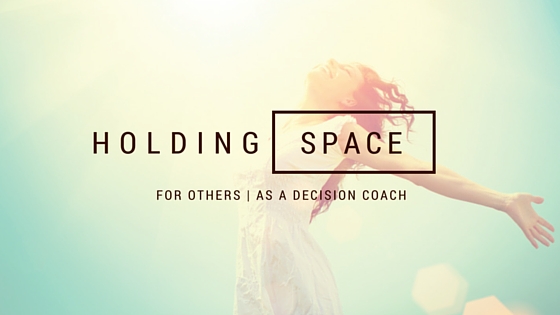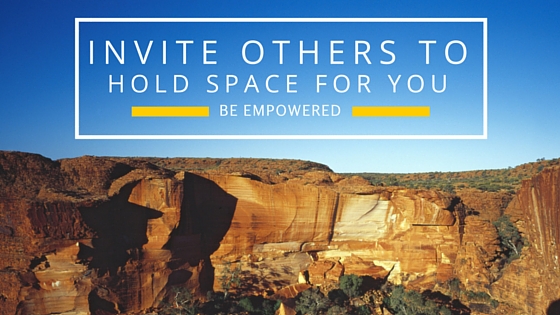When you hear the phrase “holding space for others” what images conjure up in your mind? We often hold seats for people at an event, or a place in line, but that’s not the kind of space I’m referring to here. Although I’ve been practicing the concept of “holding space for others” for over 15 years, I’ve only recently heard the phrase. “Holding space” for people as beautifully explained by Heather Plett is for me another way of thinking about and describing Decision Coaching (also referred to as decision counselling and decision support).
While decision coaching can sound intense the term holding space is gentle and inviting. The terms may sound very different from one another but in reality the two approaches share some common elements. So what does “holding space for others” mean? Heather Plett provides a definition in her blog post, “What it means to ‘hold space’ for people, plus eight tips on how to do it well”.
It means that we are willing to walk alongside another person in whatever journey they’re on without judging them, making them feel inadequate, trying to fix them, or trying to impact the outcome. When we hold space for other people, we open our hearts, offer unconditional support, and let go of judgement and control. [1]
An effective decision coach may be a little more structured in terms of how they facilitate support but in essence they are doing the same thing. Simply put, a decision coach offers non-directive support to a client, which may include their partner and/or family through a decision-making process. The decision coach guides the process (not the decision) by engaging the client in a discussion around important elements of decision-making.
Choosing an option without engaging in a decision-making process isn’t so much a decision as it is a “choice by default”. When faced with a complex decision (a decision with multiple options and no clear way forward) it is tempting to deny yourself the “space” you need to engage in a decision-making process. A decision coach “holds space” for you so that you are able to engage in productive decision-making.
A decision coach “holds space” for you.
An open access article outlines some of the ways a decision coach will “hold space” for you when faced with a decision that has multiple options. The authors suggests a decision coach will include the following elements in their support [2]:
- Helping you to assess your decision-making needs;
- Providing you with information regarding the benefits, and harms of your options (this may include the use of a Decision Aid);
- Ensuring you understand your options;
- Taking the time to help you clarify your values with respect to your options and their risks;
- Helping you to finds way to consider, discuss and access the support you need;
- Helping you to consider the reality of any hurdles you may face in implementing;
- Ensure you are making progress in your decision-making.
The next time you are faced with a complex decision, you may want to invite someone to “hold space” for you. Allowing others to “hold space” for you empowers you to make fully informed decisions. Everyone deserves that.
[1] http://heatherplett.com/2015/03/hold-space/ [2] Stacey , D , Kryworuchko , J , Belkora , J , Davison , B J , Durand , M-A , Eden , K , Hoffman , A S , Koerner , M , Legare , F , Loiselle , M C & Street , R L 2013 , ‘ Coaching and guidance with patient decision aids : A review of theoretical and empirical evidence ‘ BMC Medical Informatics and Decision Making , vol 13 , no. Supp 2 , S11 . , 10.1186/1472-6947-13-S2-S11


